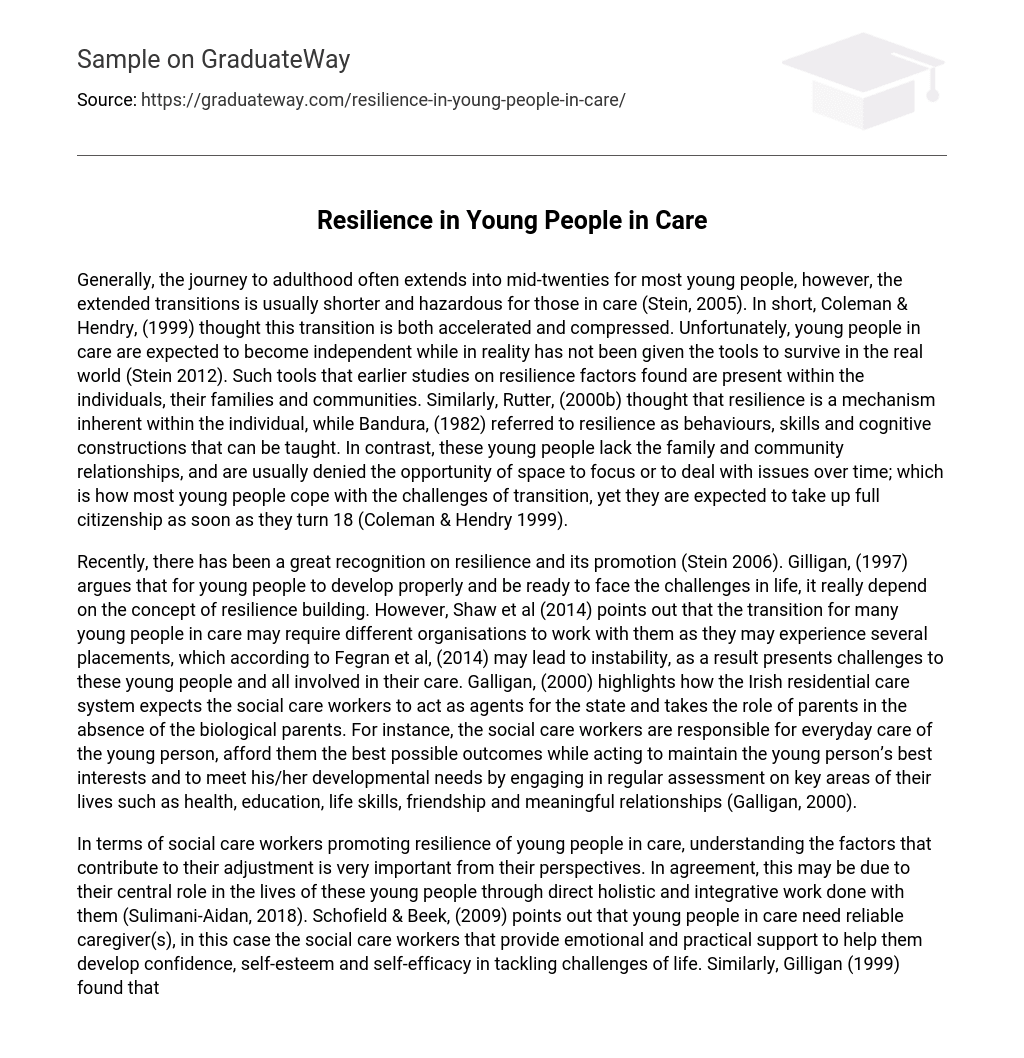Generally, the journey to adulthood often extends into mid-twenties for most young people, however, the extended transitions is usually shorter and hazardous for those in care (Stein, 2005). In short, Coleman & Hendry, (1999) thought this transition is both accelerated and compressed. Unfortunately, young people in care are expected to become independent while in reality has not been given the tools to survive in the real world (Stein 2012). Such tools that earlier studies on resilience factors found are present within the individuals, their families and communities. Similarly, Rutter, (2000b) thought that resilience is a mechanism inherent within the individual, while Bandura, (1982) referred to resilience as behaviours, skills and cognitive constructions that can be taught. In contrast, these young people lack the family and community relationships, and are usually denied the opportunity of space to focus or to deal with issues over time; which is how most young people cope with the challenges of transition, yet they are expected to take up full citizenship as soon as they turn 18 (Coleman & Hendry 1999).
Recently, there has been a great recognition on resilience and its promotion (Stein 2006). Gilligan, (1997) argues that for young people to develop properly and be ready to face the challenges in life, it really depend on the concept of resilience building. However, Shaw et al (2014) points out that the transition for many young people in care may require different organisations to work with them as they may experience several placements, which according to Fegran et al, (2014) may lead to instability, as a result presents challenges to these young people and all involved in their care. Galligan, (2000) highlights how the Irish residential care system expects the social care workers to act as agents for the state and takes the role of parents in the absence of the biological parents. For instance, the social care workers are responsible for everyday care of the young person, afford them the best possible outcomes while acting to maintain the young person’s best interests and to meet his/her developmental needs by engaging in regular assessment on key areas of their lives such as health, education, life skills, friendship and meaningful relationships (Galligan, 2000).
In terms of social care workers promoting resilience of young people in care, understanding the factors that contribute to their adjustment is very important from their perspectives. In agreement, this may be due to their central role in the lives of these young people through direct holistic and integrative work done with them (Sulimani-Aidan, 2018). Schofield & Beek, (2009) points out that young people in care need reliable caregiver(s), in this case the social care workers that provide emotional and practical support to help them develop confidence, self-esteem and self-efficacy in tackling challenges of life. Similarly, Gilligan (1999) found that the resilience of young people in care can be promoted when social care workers help them nurture their interests, such as cultural believes, sporting and other activities that help them build up their self-esteem, strengthen their mental health and form new social relationships outside their care home. Likewise, Melkman et al., and (2015); Webb et al., (2017) suggest that social care workers encourage the young people to invest in voluntary activities, taking on a care role and taking up paid work as good future investments in terms of building resilience. ****In addition, Rutter, (1990) argue that a child with good self-esteem and self-efficacy will be less vulnerable in the face of negative events in their lives, while cautioning that too little or too much of those may be harmful.
In spite of the policies and legislation to guide professionals working with young people in care, several studies such as the Jackson & Simon, (2006) found that in reality these young people often miss out on the important preparation stages which gives them the opportunity to ‘space out’, provide time for freedom, exploration, reflection, risk taking and identity search. All of which Ajayi & Quigley, (2006) argue that it is gained for majority of young people through the experience of further and especially higher education. Equally, Höjer & Johansson (2013) found that social care workers can help promote resilience in young people in care. Perhaps, if they continue to encourage completion and better scores in school, which constitute a life opportunity and a resilience factor which increases self-esteem and self-efficacy in young people. In addition, (Reffffff ) asserts that normally, when talking about transitions and resilience building, the family plays an increasing role in providing financial, practical and emotional support. However, for many young people in care their family relationships at this time may be missing or problematic rather than supportive.
Although, a resilience perspective according to Werner & Smith, (2001) offers the theoretical framework for exploring and understanding why and how some young people develop into healthy adults despite exposure to risks and adversities, while an application of a resilience framework suggests that there are differences in outcomes between those ‘moving on’, ‘surviving’ and becoming ‘victims’. While it is understood that the resilience of some of the young people in care who had turn out well had been enhanced by their experiences (Pecora et al, 2004), this is far from reality for most young people in/ leaving care who has not been able to ‘’move on’’ successfully due to disrupted placement mentioned earlier (Wade & Dixon 2006).





